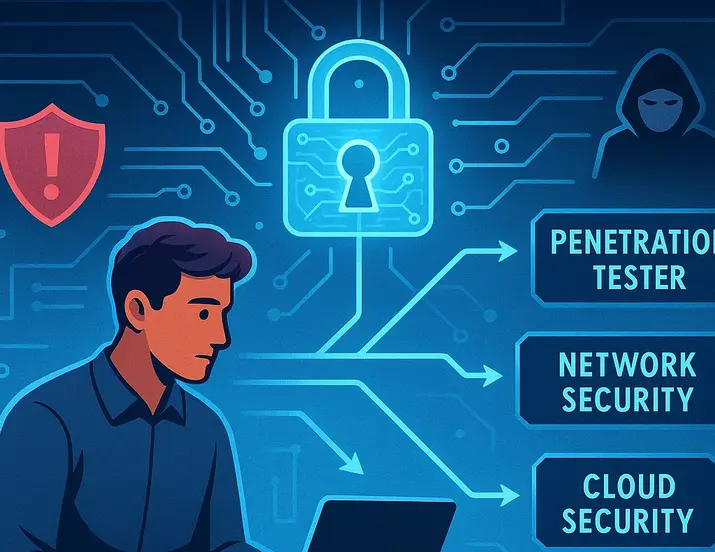Cyber security has always been one of the fastest-growing career paths, but in 2025, the industry looks very different than it did just a few years ago. High demand remains, yet breaking into the field has never been more competitive. With the rise of AI, stricter hiring standards, and a flood of newcomers pivoting into the space, many aspiring professionals are struggling to land their first role.
If you’re considering a career in cyber security—or if you’ve been applying without success—understanding today’s job market realities is critical. Let’s break down what’s happening, where the real opportunities lie, and the concrete steps you can take to stand out and get hired.

The Current State of the Cyber Security Job Market
1. Competition Is Fiercer Than Ever
Cyber security is no longer the “hidden gem” it once was. Because of its reputation for high salaries, strong job security, and career growth, the field has attracted talent from all directions:
- IT professionals pivoting into security.
- Programmers and software engineers looking for specialization.
- Career changers aiming for stability.
- New graduates seeking their first roles.
This surge in interest means employers are now flooded with applications. Instead of struggling to fill seats, companies can be more selective, often opting for candidates who already have several years of hands-on experience.
2. Entry-Level Roles Aren’t Really Entry-Level Anymore
One of the biggest frustrations for job seekers is the misleading nature of “entry-level” postings. A role labeled junior analyst may still demand:
- 2–3 years of professional experience
- Advanced certifications
- Proof of hands-on technical skills
Because the talent pool is crowded, employers default to candidates who require less training. This creates a paradox: you need experience to get hired, but you need a job to gain experience.
3. AI and Automation Are Reshaping Security Work
Artificial intelligence is transforming cyber security at every level:
- Routine tasks like monitoring alerts, scanning logs, and analyzing vulnerabilities are increasingly automated.
- This means fewer “grunt work” entry-level jobs will be available.
But it’s not all bad news. AI is also creating a new category of cyber security roles. Professionals who can leverage AI-driven tools, integrate them into workflows, and understand their limitations are in high demand. Instead of eliminating jobs, AI is shifting the skills companies value most.
Opportunities in Cyber Security for 2025
Despite the challenges, there are still high-potential pathways to break in—if you know where to look.
1. High-Growth Specializations
Several areas of cyber security are growing faster than others:
- Cloud Security: With companies migrating to AWS, Microsoft Azure, and Google Cloud, specialists who can secure cloud environments are critical.
- Incident Response & Forensics: As attacks increase, organizations need professionals who can quickly detect and respond.
- Penetration Testing (Ethical Hacking): Companies are investing in in-house red teams to proactively test their defenses.
- Governance, Risk, and Compliance (GRC): With AI bringing new regulatory scrutiny, demand for compliance professionals is rising.
2. AI as a Competitive Advantage
Instead of fearing AI, successful candidates will learn how to harness it. Employers now look for professionals who can:
- Use AI-enabled tools for monitoring and analysis.
- Automate repetitive processes to free up resources.
- Apply AI for predictive threat modeling.
Even basic AI prompting skills can set you apart from candidates who ignore the trend.
3. Freelance & Contract Work as Entry Points
If you’re struggling to land your first “official” job, freelance work and bug bounty programs can help you build credibility. Platforms like:
- HackerOne
- Bugcrowd
allow you to find real vulnerabilities, submit reports, and earn income while developing a professional portfolio.
These gigs can demonstrate your skills far better than a line on a resume.
Hire Cyber Security Specialists in 2025
Post your job on WhatJobs and connect with cloud security experts, ethical hackers, GRC professionals, and AI-savvy talent ready to protect your business.
Post a Job Now →How to Actually Get Hired in Cyber Security
Breaking in requires more than just certifications—it’s about combining learning, hands-on practice, and networking.
Step 1: Get Certified (the Right Way)
Certifications are still valuable, but employers increasingly expect them to be paired with experience. Good starting points include:
- CompTIA Security+ – widely recognized, great for beginners.
- Google Cybersecurity Professional Certificate – entry-level, hands-on projects included.
After building a foundation, aim for advanced or specialized certifications:
- Blue Team Level 1 (BTL1) – for defensive security.
- Offensive Security Certified Professional (OSCP) – for penetration testing.
- CompTIA CySA+ – for intermediate-level security analysts.
Step 2: Get Hands-On Experience
Hands-on practice is where most beginners fall short. Options include:
- TryHackMe and HackTheBox for practical labs.
- Building home labs with virtual machines to simulate attacks and defenses.
- Personal projects (e.g., setting up a SIEM, monitoring network traffic, or performing mock penetration tests).
Document these projects and put them on your resume, GitHub, or LinkedIn profile.
Step 3: Build Real-World Credibility
Employers care about what you’ve done, not just what you’ve studied. To stand out:
- Join Capture the Flag (CTF) competitions.
- Contribute to open-source security projects.
- Publish blogs or LinkedIn posts about your projects, findings, or lessons learned.
This shows initiative, passion, and applied skill.
Step 4: Network Like It’s Your Job
Most cyber security jobs are filled through referrals and networking, not cold applications. To improve your odds:
- Stay active on LinkedIn and security forums.
- Attend conferences (even virtually).
- Reach out for informational interviews with professionals in your target role.
A genuine connection with someone already in the industry can often bypass automated application systems.
Step 5: Commit to Continuous Learning
Cyber security changes rapidly. To stay competitive:
- Follow news outlets like Krebs on Security, Dark Reading, or The Hacker News.
- Subscribe to security newsletters.
- Keep experimenting with new tools and techniques.
The professionals who thrive in 2025 will be those who view cyber security as a lifelong learning journey.
Launch Your Cyber Security Career in 2025
Search WhatJobs for thousands of cyber security openings—filter by certifications, roles, and location to find your perfect fit.
Search Cyber Security Jobs →Final Thoughts
Cyber security in 2025 is both crowded and full of opportunity. Yes, competition is fierce, entry-level roles are tougher to land, and AI is reshaping the industry. But for adaptable candidates who gain real experience, specialize in high-demand areas, and embrace new tools, the pathway is still wide open.
Remember: certifications get you noticed, but projects, portfolios, and connections get you hired.
FAQs About Cyber Security Careers in 2025
1. Is it too late to start a career in cyber security in 2025?
No. While competition is higher, demand for skilled professionals continues to grow. The key is choosing a specialization (like cloud security or penetration testing) and building hands-on skills.
2. Do I need a degree to work in cyber security?
Not necessarily. Many employers now prioritize skills, certifications, and project experience over formal degrees. However, a degree can still be helpful for advancing into management roles.
3. How is AI affecting cyber security jobs?
AI is automating repetitive tasks, which reduces some entry-level roles. But it’s also creating demand for professionals who can work with AI tools, interpret outputs, and design security strategies around them.
4. What’s the fastest way to get my first cyber security job?
Combine an entry-level certification (like Security+) with hands-on practice (labs, personal projects, bug bounty work). Pair this with networking to land referrals, which drastically improves your odds of getting hired.




